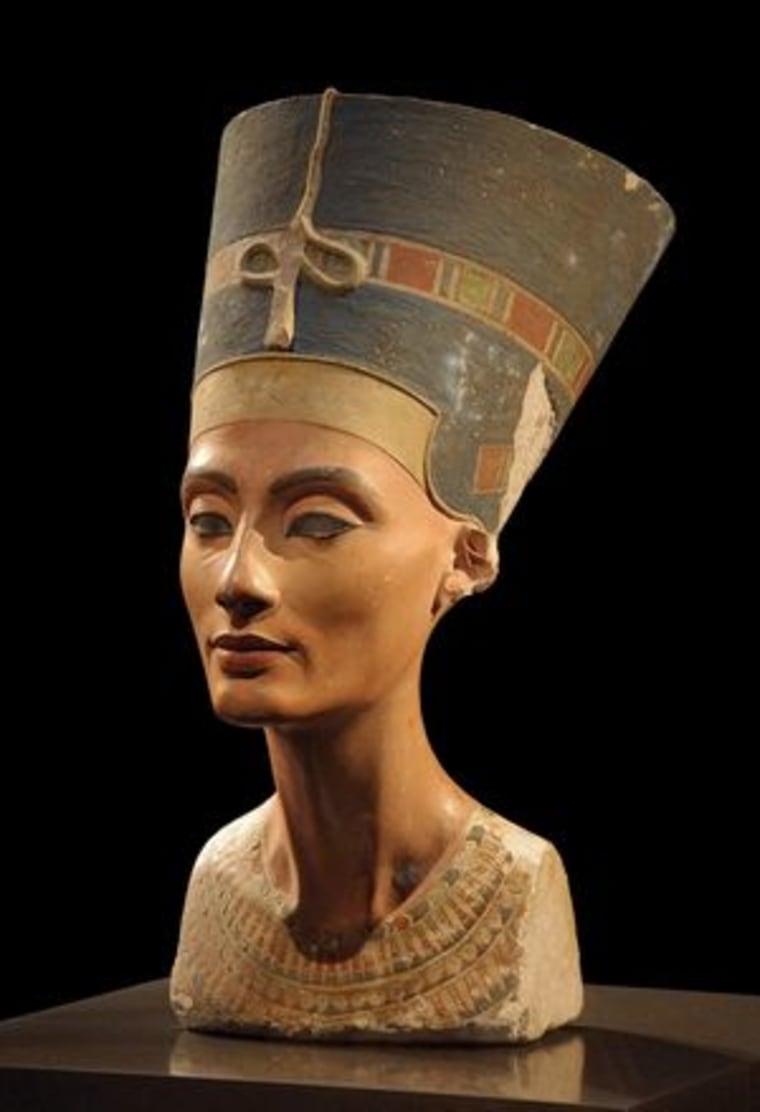Egypt formally demanded the return of the 3,300-year-old bust of Queen Nefertiti, saying it was sneaked out of the country illegally.
Dating from the 14th century B.C., the 19-inch painted limestone bust is credited with making Nefertiti famous worldwide.
Renowned as one of history's great beauties, Nefertiti (1370 B.C.-about 1330 B.C.) was the royal wife of the "heretic" pharaoh Akhenaton, who initiated a new monotheistic religion that involved the worship of the sun god Aton.
Missing one eye, the portrait shows the beautiful queen with a long, slender neck, elegantly arched brows and a tall, blue crown.
“It is a unique and irreplaceable artifact,” Egypt’s Supreme Council of Antiquities (SCA) said in an emailed statement.
The statement added that an official request for restitution was made to Hermann Parzinger, president of the Prussian Cultural Heritage Foundation in Berlin, which oversees all of Germany's state museums, after "four years of research by a legal committee composed of famous legal personnel and Egyptologists.”
The bust was unearthed in 1912 by German archaeologist Ludwig Borchardt in the workshop of the court sculptor Thutmose at the ancient site of Amarna.
According to the Egyptian authorities, Borchardt sneaked the bust out of Egypt under a coating of clay and shipped it to Germany.
He deliberately described the artwork as the portrait of a royal princess made of plaster, although he knew that it was a limestone statue of Queen Nefertiti.
“It is clear from all the records that Borchardt recognized immediately the unique nature and artistic quality of this piece, as well as its historical importance,” the SCA said.
Egypt first requested the restitution of the statue in the 1930s, but Germany always denied any request, insisting that the bust was obtained legally.
In 2007 Germany even refused to lend the statue for a three-month exhibition in Egypt, saying that Nefertiti's bust was too fragile to transport.
The latest Egyptian request will be no exception, according to a statement by the Prussian Cultural Heritage Foundation.
“The foundation’s position regarding a return of the bust of Nefertiti is unchanged. She is and remains Egypt's best ambassador in Berlin,” the foundation president, Hermann Parzinger, said.
Currently on display at Berlin's Neues Museum as Inventory No. AM 21300, the limestone bust is first on the wish list of five important objects that Egypt hopes to have returned.
The secretary general of the Egyptian Supreme Council of Antiquities, Dr. Zahi Hawass, claims to have secured the return of some 5,000 treasures during his SCA tenure, the list includes the Zodiac of Dendera at the Louvre museum; the Rosetta Stone at the British museum; the bust of Achhaf, the builder of the Chephren Pyramid, at the Museum of Fine Arts in Boston; and a statue of Hemiunu, the nephew of Pharaoh Khufu, from Germany's Roemer-Pelizaeu museum.
“The bust of Nefertiti, upon its return, will be exhibited at the Akhenaten Museum in Minya opening in early 2012,” Hawass said.
